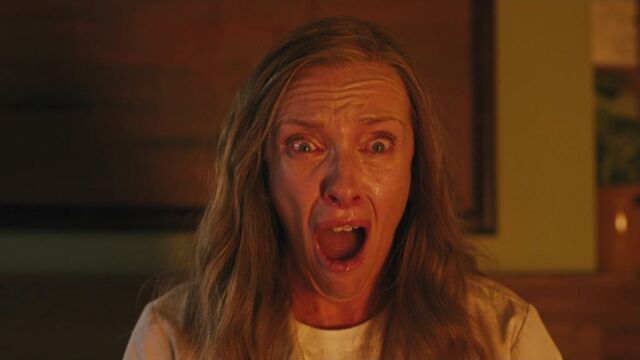What better way to get into the Halloween spirit than to organize a 'scary movie' party? But once you've floated the idea to your friends, two distinct camps quickly emerge. On the one hand, fans of the occult, gore, monstrous creatures and psychopathic killers. On the other, those who hide under the comforter to watch the show. So why do some people enjoy these frightening moments, while others can't stand them? Science provides some answers.
Discover our latest podcast
Horror and immersion
Whether it's the result of areal event or fictitious conjuring, thefeeling of fear comes from the same brain organ, the amygdala. Its function? To process emotions, in order to trigger a response (fight, flight, inaction). To do this, it releases various transmitters and hormones, such as adrenalin, cortisol, serotonin, endorphins, and others. These chemical messengers increase heart rate and blood pressure, and speed up breathing... All to put us in a state of intense preparation.
In the case of watching a horror film, it's these sensations that make us feel... as if we were in the film ourselves! However, unlike the characters on the screen, we're not facing a real threat. The flood of fear is countered by a deep senseof security, allowing us to take full advantage of the hormone 'rush'. It's the same process that comes into play with thrill-seekers. Some people seek out experiences that enable them to reach this state. This is particularly true in adolescence, which explains why horror films are targeted at the under-twenties.
We're not all equal when it comes to fear
But not everyone enjoys this experience of fear. On the contrary, some hate it. And with good reason: we're not all made up in the same way. Researchers have discovered that variations in serotonin levels can be genetically determined. Some brains may not release enough serotonin to overcome the terror of a horror film. Negative emotions prevail, and the screening appears to be torture.
There are also differences between men and women, but they'renot necessarily biological. 'Maybe it's because men are socialized to be brave', Glenn Sparks, professor at Purdue University's Brian Lamb School of Communication (USA), tells PsychCentral.
Men wouldn't like to be scared in front of a horror movie any more than women would... But to show they have the courage to handle it. 'It's the idea of mastering something threatening,' he said. Thus, bloody or hyperviolent films appeal more to the male gender, while psychological thrillers are appreciated by both sexes.
Childhood experiences also play their part. Trauma experienced during this period of life - neglect, abuse - can affect the amygdala, and thus affect tolerance and sensitivity to terror. On the contrary, good memories of fear in children can anchor the idea that it's fun to be scared.
The fear may continue after the film
While some go on with their lives as if nothing had happened, others cannot escape the horror of the film for days or even months afterward. Lying in their beds in a sideways position, their stomachschurning at the thought of a monster coming out of their closet, they will bitterly regret having watched the film. Because their fear has turned into anxiety. Anxiety, unlike fear anchored in the present, is based in the future. It's the fear that something might happen.
At the time, the brain registers that the events in the film are not real, so it may find it difficult to reduce the anxiety in the night once back in reality. Negative emotions then outweigh the excitement generated by the film. In fact, they remain more firmly anchored in the amygdala than the negative emotions. Some people can thus 'suffer persistent emotional after-effects if something in the environment reminds them of a scene', says the researcher.
For example, as soon as the film Jaws was released in 1975, the irrational fear of sharks grew. Forty years later, it's well and truly established. Horror films can also be the source of certain phobias, such as that of blood (hematophobia), enclosed spaces (claustrophobia) or insects (entomophobia).
Excitement too
What's more, the good (or bad) moments induced by the film are just as important as the aftermath, according to Glenn Sparks. This is known as the 'excitation-transfer process'. According to his research, physiological excitement - increased heart rate, blood pressure and breathing - persists unconsciously after the screening. All the emotions you experience afterward are intensified, and may (or maynot) make you want to relive the experience.
For example, the combination of a chilling thriller followed by a wonderful evening with loved ones will weigh positively on your mind. On the contrary, a car accident on the way home will dissuade you from returning to your cinema.Professor Sparks assures:
Once again, because your persistent excitement intensifies the emotions you feel, negative feelings may encourage you to avoid a scary movie in the future.
Horror buffs can take advantage of the Halloween season to watch their favorite thrill-seeking films. The rest of us will - to our heart's content - enjoy a hot chocolate in front of a Sunday TV movie. However, it is possible to move from a total rejection of horror to a moderate love of it, not least by choosing and controlling the scary things we expose ourselves to. By putting up with 90 minutes of fear, you'll feel more resilient. And you'll be less scared next time!
This article has been translated from Gentside FR
Read more:
⋙ Obsessed with true crime? Here is what it says about your personality
⋙ Netflix: the 25 horror films and TV shows to watch on Halloween
Sources:
PsychCentral: Why Some People Love Horror Movies















